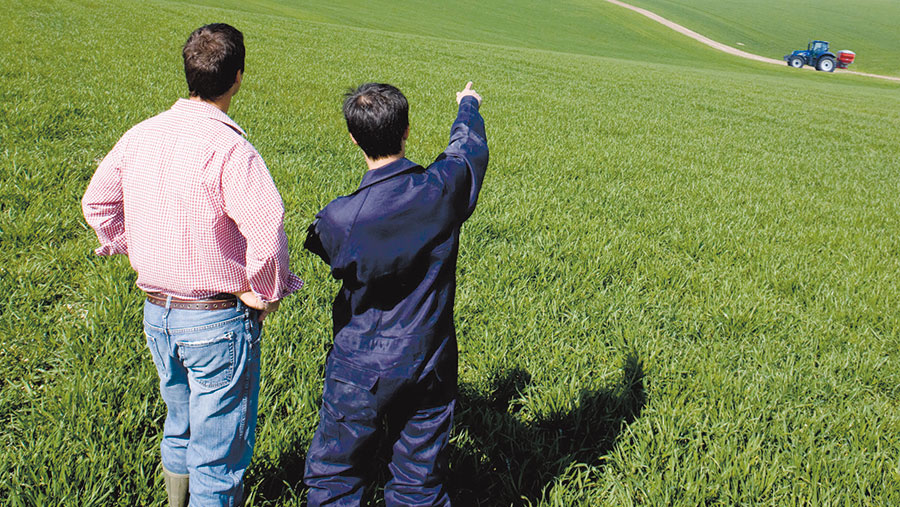How to run appraisals that help the business and employees
 © Juice/Rex/Shutterstock
© Juice/Rex/Shutterstock Retaining and developing staff is a huge issue for many farms. With a growing labour shortage at all levels, it’s more important than ever to get this right.
Richard Simpson from Kingshay and George Gordon of LKL Services highlight the importance of annual appraisals.
Productive and regular staff appraisals should encourage open feedback, identify training requirements and improve staff productivity and morale.
The first step is to prepare well – let your staff know in plenty of time where and when the appraisal will take place, what form it will take and the opportunity it offers them.
See also: A legal guide to employing farm staff
There is a temptation to lump the appraisal process in with an annual pay review, but that is likely to stifle honest discussion
Preparation tips
It’s easy to put off appraisals, particularly at busy times, so make sure it’s in the diary in good time.
An appraisal should be a positive, relaxed process, not a negative and scary occasion, so hold it in a nice environment and allow plenty of time for feedback.
The person conducting the appraisal should refer to the employee’s job description and previous objectives, to measure achievement over time.
Make a note of a list of positives to highlight, as well as any points to address and training required, as well as future aims and objectives.
If appraisals haven’t been formalised before, start with a relatively low-key approach.
Frequency
Hold at least one a year, more often if possible.
It’s also important to address issues as they arise through the year – don’t let them ramp up to become a long list of problems tackled once a year.
Who’s involved?
The appraisal should be held with the employee’s immediate line manager – if they report to one person almost every working day, their appraisal should never be held with someone else.
The same applies to agency staff, although an agency manager may also be involved.
The review itself
Many people feel nervous about either attending or holding an appraisal, but as far as possible it should be a positive, two-way discussion covering strengths, weaknesses and ideas.
While it must not turn into a nagging session, don’t shy away from negative aspects. If left unaddressed, small issues and irritations that are easy to tackle could turn into bigger problems which trigger people to leave.
Give a clear invitation both before and during the appraisal meeting that this is a two-way process and that you are open to feedback. Managers and business owners should be prepared to adapt if necessary, too. It’s all about listening and giving weight to other peoples’ opinions, which helps to make them feel valued and included.
Watch your language: An example
Avoid the word “but”. Everything that comes before it is forgotten. For example: “You have done very well but calf mortality has been awful” would be better expressed as: “You have done very well and during this coming season you might treat calf mortality as your principle challenge”.
Training and job development
Staff need to feel that you are invested in their future, which means helping them to develop their skills and empowering them through career development. Training could be technical, such as a foot-trimming course, or on-farm through tackling new tasks, or take the form of continuous professional development through attending conferences, workshops and farm walks.
Health and safety
Set rules and guidelines and communicate what is acceptable. While a diligent approach should always be the case, this is particularly important for young, new staff and/or migrant workers.
Appraising poor performance
Poor performance must be addressed and if tackled sensitively this can be a positive process.
It’s important the employee accepts there is a problem, so have the evidence to back up any claims you make. Offer them a chance to explain themselves.
Agree a need to improve and set out how that can be achieved, and set a date for a future review to assess progress. Try to end on a positive note.
Finalising the review
Write down your employee’s objectives and training plans for the year ahead, and if their tasks have changed and evolved, amend their job description, confirming all of this in writing to the employee after the appraisal.
Try to link objectives to the long-term strategy of the business.
Few farmers manage to communicate their short and long-term strategies with staff, so the appraisal can be a good time to cover this.
Staff will always want to know what their future holds, so be prepared to answer potentially tricky questions about the viability or direction of the business.
Make sure you follow through and deliver on any promises of training or amended working practices, otherwise the value of an appraisal will be lost and motivation along with it.
Appraisals with family staff members
The principle of holding an annual appraisal still holds for family members although it may be less formal. It can be useful to involve a third-party, for example, a consultant who works regularly with the business, particularly if there are any performance issues.
Top tips
- Get a date in the diary, allow plenty of time, and prepare well
- Be open and positive – it’s a two-way dialogue
- Address any issues and follow through with action
- Identify training requirements and career development
- Strive to achieve job satisfaction and motivated staff
- Don’t forget family members
- Tie individual objectives into the business strategy
